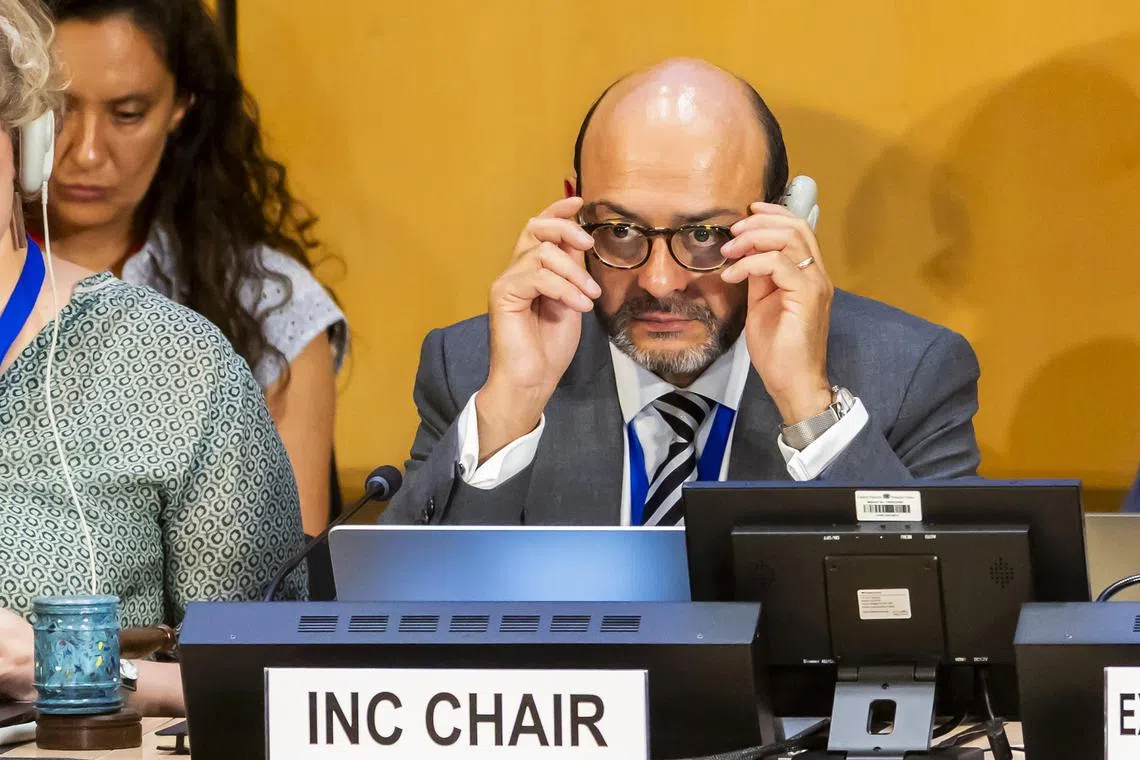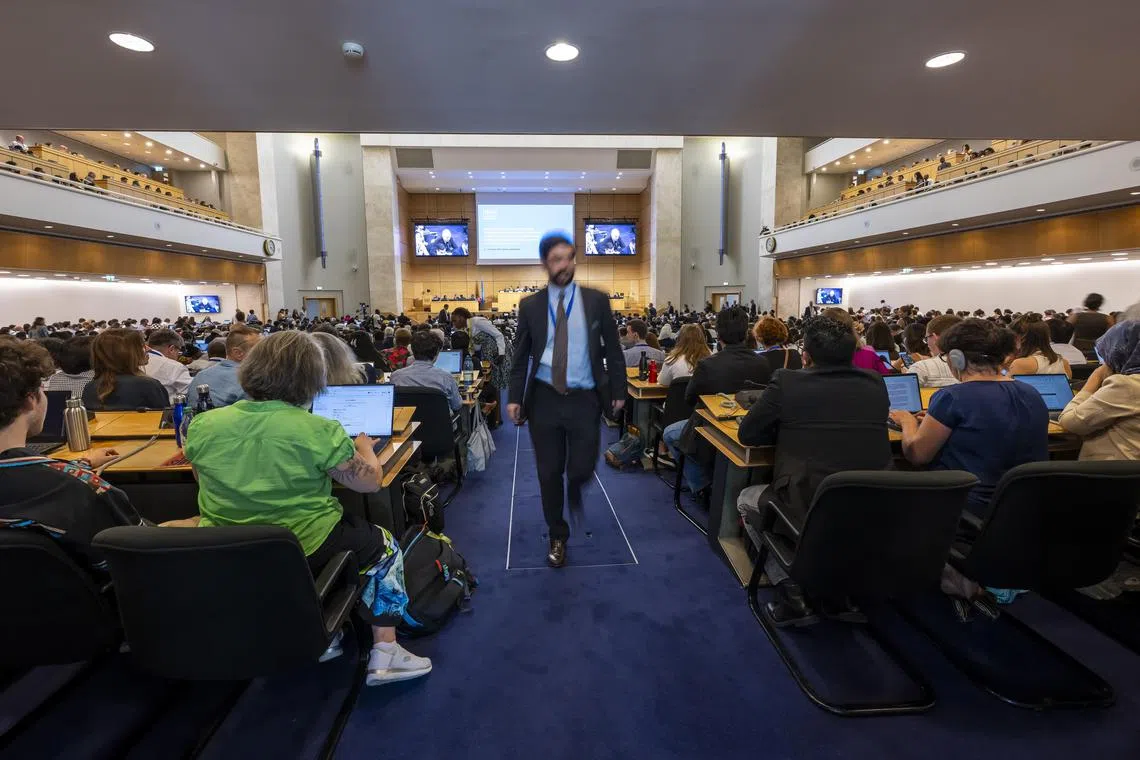UN plastic pollution treaty talks in disarray after countries reject draft text
Sign up now: Get ST's newsletters delivered to your inbox

The latest draft of a treaty on combating plastic pollution, presented by the International Negotiating Committee chairman Luis Vayas Valdivieso, was rejected by dozens of countries.
PHOTO: EPA
- UN talks to create a treaty tackling plastic pollution are in disarray after countries rejected the proposed draft text, calling it too weak or too restrictive.
- Ambitious nations criticised the draft for lacking legally-binding action, while oil-producing states said it crossed their "red lines" by not focusing on waste management.
- With time running out, the draft faces widespread condemnation from countries and NGOs, who say it fails to address the plastic crisis's urgency and scope.
AI generated
GENEVA - Attempts to secure a landmark treaty combating plastic pollution descended into disarray on the penultimate day of talks on Aug 13 as dozens of countries rejected the latest draft text, leaving the talks in limbo.
With time running out to seal a deal among the 184 countries gathered at the United Nations in Geneva, several countries slammed a proposed compromise text put forward by talks chair Luis Vayas Valdivieso from Ecuador.
A larger bloc of countries seeking more ambitious actions blasted what they consider a dearth of legally binding action, saying the draft text was the lowest common denominator and would reduce the treaty to a toothless waste-management agreement.
But oil-producing states said the text went too far for their liking, crossing their red lines, too, and not doing enough in paring down the scope of the treaty.
The talks towards striking a legally binding instrument on tackling plastic pollution opened on Aug 5.
Five previous rounds of talks over the past 2½ years failed to seal an agreement, including a supposedly final round in South Korea in 2024.
But countries seem no closer to reaching a consensus on what to do about the ever-growing tide of plastic rubbish polluting land, sea and human health.
With a day left to go, Mr Vayas presented a new draft, but the discussions quickly unravelled as the text was savaged from all quarters.
‘Without ambition entirely’
Panama said the goal was to end plastic pollution, not simply to reach an agreement.
“It is not ambition: It is surrender,” its negotiator said.
The European Union said the proposal was “not acceptable” and lacked “clear, robust and actionable measures”, while Kenya said there were “no global binding obligations on anything”.
Tuvalu, speaking for 14 Pacific island developing states, said the draft risked producing a treaty “that fails to protect our people, culture and ecosystem from the existential threat of plastic pollution”.
Britain called it a text that drives countries “towards the lowest common denominator”, and Norway said: “It’s not delivering on our promise... to end plastic pollution.”
Bangladesh said the draft “fundamentally fails” to reflect the “urgency of the crisis”, saying that it did not address the full life cycle of plastic items, nor their toxic chemical ingredients and their health impacts.
“This is, as such, without ambition entirely,” it said.
‘Not worth signing’
A cluster of mostly oil-producing states calling themselves the Like-Minded Group – which includes Saudi Arabia, Russia and Iran – want the treaty to focus primarily on waste management.
Kuwait, speaking for the club, said the text had “gone beyond our red lines”, adding: “Without consensus, there is no treaty worth signing.”
“This is not about lowering ambition: It’s about making ambition possible for all,” it said.
Saudi Arabia said there were “many red lines crossed for the Arab Group” and reiterated calls for the scope of the treaty to be defined “once and for all”.

A cluster of mostly oil-producing states want the treaty to focus primarily on waste management.
PHOTO: EPA
The United Arab Emirates said the draft “goes beyond the mandate” for the talks, while Qatar said that without a clear definition of scope, “we don’t understand what obligations we are entering into”.
India, while backing Kuwait, saw the draft as “a good enough starting point” to go forward on finalising the text.
‘Betrayal of humanity’
Environmental non-governmental organisations also blasted the draft.
The proposed text “is a gift to the petrochemical industry and a betrayal of humanity”, said Greenpeace delegation chief Graham Forbes.
The World Wide Fund for Nature called the draft text a “devastating blow” to people suffering from the impact of plastic pollution.
The Centre for International Environmental Law delegation chief David Azoulay said it “all but ensures that nothing will change” and would “damn future generations”.
More than 400 million tonnes of plastic are produced globally each year, half of which is for single-use items.
While 15 per cent of plastic waste is collected for recycling, only 9 per cent is actually recycled.
Nearly half, or 46 per cent, ends up in landfills, while 17 per cent is incinerated and 22 per cent is mismanaged and becomes litter. AFP


